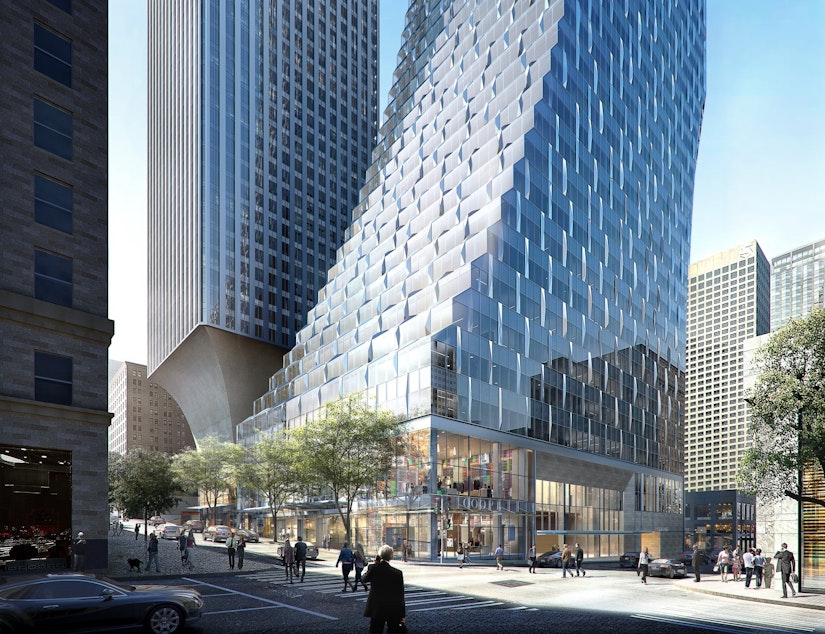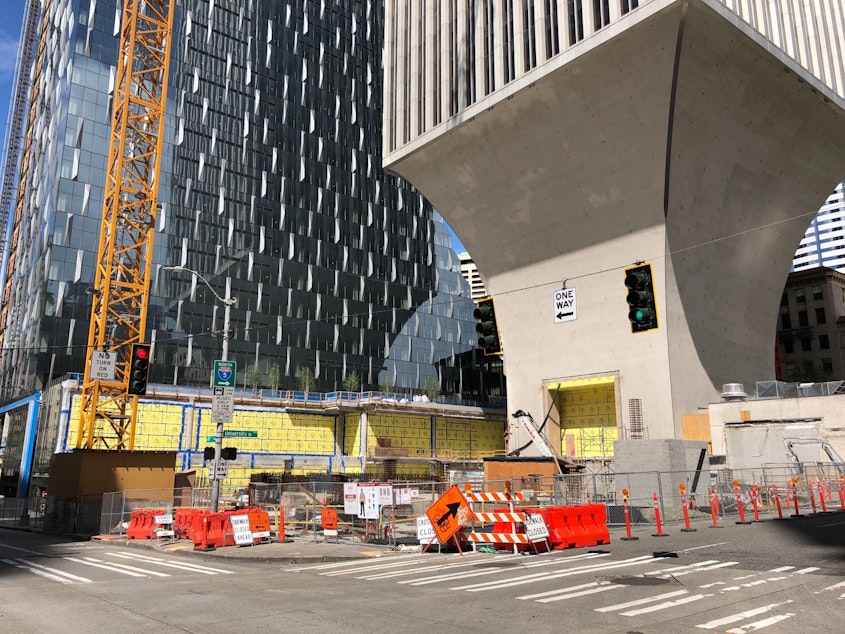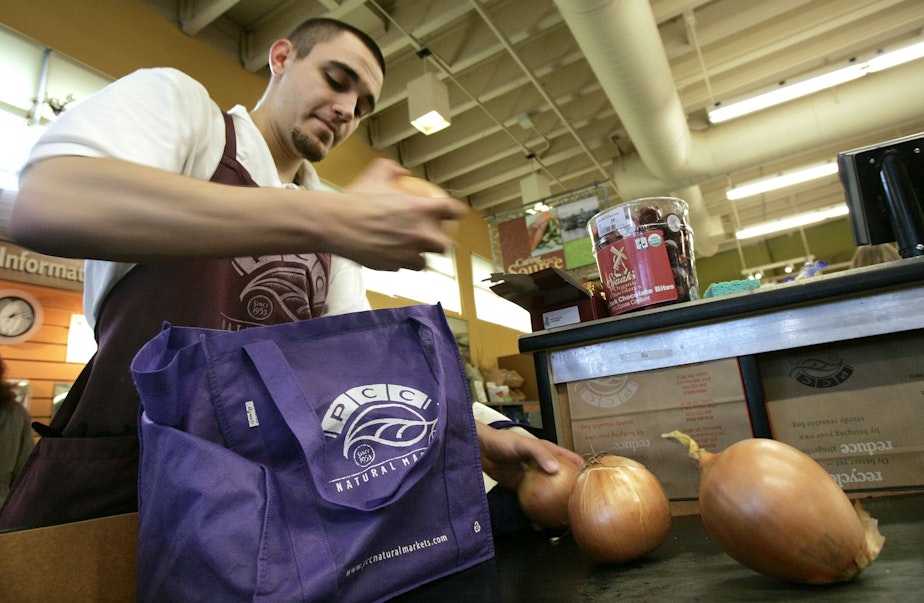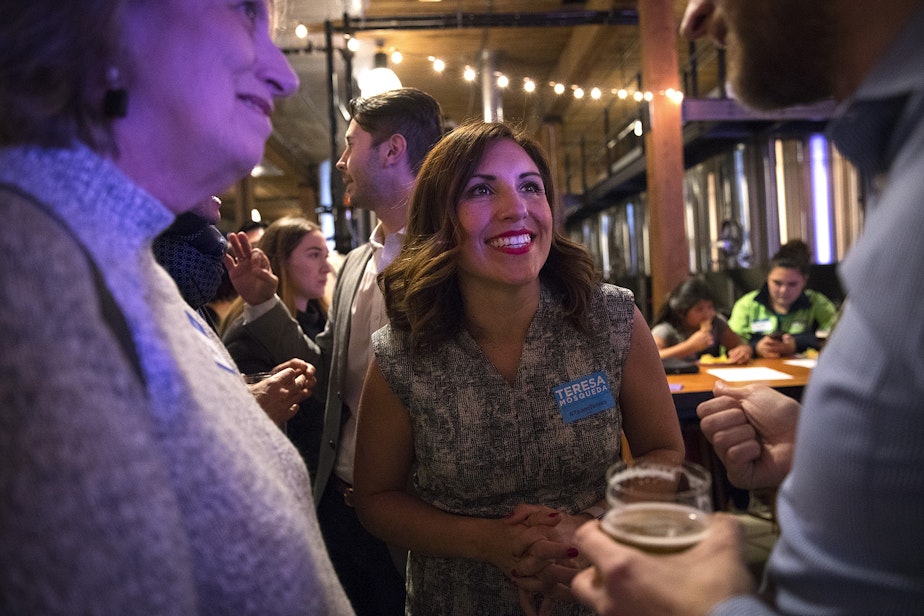What's behind PCC's decision to close its flagship store in downtown Seattle?

When PCC announced plans for a flagship grocery store in Seattle’s urban core, it was based on a dream of downtown that never came true.
Then-CEO Cate Hardy envisioned hundreds of Amazon employees descending from their offices above to grab lunch at the PCC. Opening a grocery store on the ground floor of Amazon’s newest office tower, Rainier Square, made good business sense.
“Downtown Seattle is a vibrant and growing neighborhood with so many different appetites — from the lunch crowd hungry for a quick, made-from-scratch bite to tourists craving an authentic taste of our city to the growing population of residents who want to stock their kitchens with fresh, local, organic, sustainably sourced and seasonal fare,” Hardy said in a 2018 press release.
The problem? Amazon never moved in.
When PCC announced Wednesday it would close the flagship grocery store just two years after opening its doors, familiar laments about the state of downtown rang out. Downtown has struggled to rebound after the pandemic, driven by a range of factors from fewer commuters to safety concerns. PCC itself said those issues were partly to blame for the store’s closure.
But it’s not quite that simple.
Sponsored
The story of this troubled location pre-dates the pandemic. It starts at a time when Seattle’s economy was thriving, and its downtown office market was red-hot. It starts with a battle between Amazon and the city.

Rainier Square has always been a symbol. The shining, 58-story office tower curves upward toward the sky like a chart predicting limitless growth. When Amazon committed to moving into all 30 floors of office space in Rainier Square, that’s how downtown Seattle felt, too. The tech industry had an insatiable appetite for real estate and office rents were surging faster than any other city in the country. That was the environment in which PCC chose Rainier Square for its flagship store.
But with all that demand came growing pains. The Seattle City Council — under pressure to mitigate the housing crisis, homelessness, and other issues driven in part by a booming tech sector — began eyeing a tax that would target Amazon. The Council wanted a per-employee tax on the city’s largest companies to fund affordable housing. Amazon balked, claiming the city wanted to use it as an ATM.
As part of its campaign against the tax, Amazon paused construction on several projects downtown and threatened to sublease Rainier Square to another tenant. The City Council passed the tax anyway but repealed it shortly after amid public pressure. The damage, however, appeared to be done. In 2019, Amazon put all 30 floors of Rainier Square on the sublease market, after PCC had already committed to moving in.
Sponsored
“The fact that there were supposed to be hundreds, if not, thousands of employees above that grocery store that aren't there today, I think is certainly potentially a factor in the level of business and sales volume within the grocery store,” said Jon Scholes, CEO of the Downtown Seattle Association. “I don't think it should be lost on anybody that the consequences of City Hall’s dysfunctional relationship with the city's largest employer may have had some consequences here.”
RELATED: Amazon starts tracking employee badge swipes to enforce return-to-office policy
It was a difficult time to find new tenants. As 2019 drew to a close, Covid-19 was already circulating in the Seattle area. By 2020, tech companies sent their employees home indefinitely, and downtown has struggled to recover ever since.

“PCC made a commitment to the downtown location in 2018, when the global pandemic and its impact on the local community could not have been envisioned,” said PCC CEO Krish Srinivasan in an email to customers. “We expected then that this store would cater both to city residential shoppers and lunchtime office workers — a necessary mix in order to be viable.”
Srinivasan did not blame a lack of office workers for the stores closure, but said the store isn’t getting the volume of “large grocery basket shoppers” it needs to stay afloat. Earlier this year, PCC told members of its co-op program that they would not receive a dividend this year because the company had suffered $250,000 in losses in 2022. PCC blamed the loss, in part, on poor performance at the downtown store.
Sponsored
The store will close Jan. 31, 2024 and its roughly 80 employees will be offered jobs at other locations. Amazon would not say what percentage of office space in Rainier Square has been subleased to other tenants, but The Puget Sound Business Journal reported the offices were about half full in August.
Meanwhile, Amazon continues to have a difficult relationship with Seattle officials. The City Council passed a different, but related, tax targeting Amazon and other big companies in 2020. JumpStart is a payroll tax on high salaries intended to fund affordable housing and environmental initiatives. Funds from the tax also temporarily provided pandemic relief. Scholes said he worries some of the Seattle City Council candidates in the upcoming election want to expand JumpStart to fill a large budget hole. But Council Chair Teresa Mosqueda, JumpStart’s champion, said business taxes ultimately help downtown recover.

"The revenues we have seen come to the city, whether it's B&O taxes or JumpStart, those funds are being turned around and directly being infused into creating economic vitality in the downtown core and across the city," Mosqueda said in an interview with KUOW earlier this year. "We have seen businesses shutter during these times, we have seen people lose their livelihoods, and their lives, during Covid. But what the revenue returns have been able to do is infuse funding into small business support, direct worker support, and especially helping our most marginalized businesses."
RELATED: Some Amazon employees opt to leave company instead of moving closer to offices
As for one of Seattle’s least marginalized businesses, it’s not growing in the city the way it used to. Amazon is focusing its future growth in the region on its offices in Bellevue.
Sponsored
“Downtowns have always been fragile,” Scholes said. “You got to work really hard to make them work. We were on a really strong path pre-pandemic. I think we're emerging in really strong ways, particularly relative to our West Coast peers. But when you don't have a healthy relationship between city government and your employer community, I don't think that bodes well for downtowns.”
Editor's note: Amazon is among KUOW's financial supporters.




